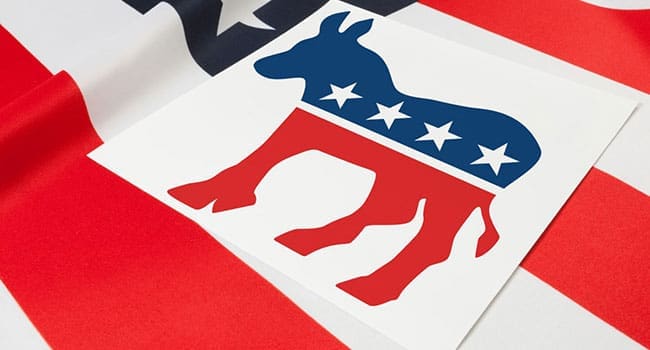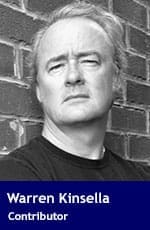Philosophically, ideologically, emotionally: the political party I belong to, in my head and my heart, is the Democratic Party of the United States. And if I still lived stateside, that’s the party I would be voting for, and the party I would be working for 24/7. (Full disclosure: my wife and I are, in fact, volunteering on Hillary Clinton’s presidential campaign in Maine and New York.)
This isn’t to say, however, that I’m not still a Liberal Party supporter, or that I don’t think the Conservative Party or the New Democratic Party often have good ideas and good people. Notwithstanding their quirks and peccadilloes, I like Canadian partisans a lot. They’re passionate, intelligent, motivated folks – whether they be Grit, Tory or Dipper. They make a difference.
But the three main Canadian political parties aren’t all that different. They possess distinctions without differences. Case in point: the 2015 Canadian election campaign – when the New Democrats (with balanced budgets and billion-dollar budgets for defence) moved right, the Liberals (with deficit spending and pulling out of the ISIS fight) moved left, and the Conservatives (with their willingness to boot out any candidate who dared raise the topics of abortion or gay marriage) moved away from what they had once been.
In 2015, and before, you needed a magnifying glass to detect dissimilarities between the Canadian political parties. The 2015 campaign was about personalities, not policy, and Justin Trudeau won because he had a nicer personality than the other two guys.
Not so in the U.S. There, there is true political clarity. There, the contrasts are real and readily seen. There, there is (and usually is) a clear choice between two political polarities.
Up here, all of the Canadian political parties often become indistinguishable when they win the privilege of power. Bob Rae’s New Democrats (appropriately) imposed austerity measures when they ran things in Ontario, and Stephen Harper’s Conservatives (appropriately) spent like drunken sailors in the aftermath of the 2008-2009 global recession. And Trudeau’s Liberals (belatedly, but correctly) decided they’d been wrong about ISIS, and have committed Canada to something Harper never did – troops on the ground, in harm’s way.
But in the U.S.? The Democrats and the Republicans approach governing very differently. The former believe government can be a force for good, and the latter simply don’t. The aforementioned 2008-2009 global recession came about precisely because Republicans eliminated government’s ability to regulate Wall Street’s excesses. Democrats, meanwhile, used government power and spending to clean up the GOP’s mess.
In the U.S., they don’t pussyfoot around with Orwellian Newspeak, like Canadians do on the issue of abortion. Up here, we prattle on about “choice” and play semantic games, calling one side “pro-life” and the other “pro-choice,” so that they almost sound like they believe in the same thing. Down there, the issue is “abortion,” and you are either for it (like the Democrats always are) or you are against it (like the Republicans always are).
I’m for it. Abortion should be safe, rare and legal.
In the U.S., Democrats don’t like capital punishment, and the Republicans do. But Democrats – like me – believe that sometimes the state is entitled to apply the ultimate penalty. When there is guilt beyond a reasonable doubt – in the case of Paul Bernardo, say, who tortured and raped and murdered children on film – Democrats reluctantly accept that capital punishment can and should be applied. I do, too.
In the U.S., Democrats don’t particularly like war, while Republicans think it is the solution to every problem. But, unlike in Canada – where our defence capacity has been underfunded for generations, through successive governments of all stripes, and where we depend on other nations to maintain our national defence – Democrats are unafraid to use military might when diplomacy fails.
Thus, Hillary Clinton pushed for the assassination of Osama bin Laden, Bill Clinton led the military effort to stop the Bosnian genocide, and Barack Obama has raised military spending to historic highs – comparatively higher than it was during Ronald Reagan’s Cold War buildup, in fact. Under Obama, for example, Obama’s “surge” of U.S. troops in Afghanistan was double what it was under George W. Bush. Democrats aren’t wimps.
It’s worth noting, here, that most Canadians mostly agree with the Democratic position on all of the stuff above. An Ipsos poll showed in February that six in 10 Canadian favour abortion “in any circumstances.” For years, in poll after poll, an equivalent number of Canadians – about two-thirds – support the death penalty. And various surveys over the past decade show slightly fewer Canadians support more or stable defence spending – about half. But, when it comes to taking on the likes of ISIS, as many as three in four Canadians opposed Trudeau’s promise to withdraw from the anti-ISIS bombing mission. And nearly as many want to see more resources devoted to the anti-ISIS fight.
See? I may be Democrat, but the majority of Canadians are, too. Liberals, Conservatives, and New Democrats, take note.
Warren Kinsella is a Canadian journalist, political adviser and commentator.
Warren is a Troy Media contributor. Why aren’t you?
The views, opinions and positions expressed by columnists and contributors are the author’s alone. They do not inherently or expressly reflect the views, opinions and/or positions of our publication.




Letter to the Editor:
That headline should be changed to Most of Canada’s elite are actually U.S.-style Democrats
Dana Wilson
Alberta, and proud of it